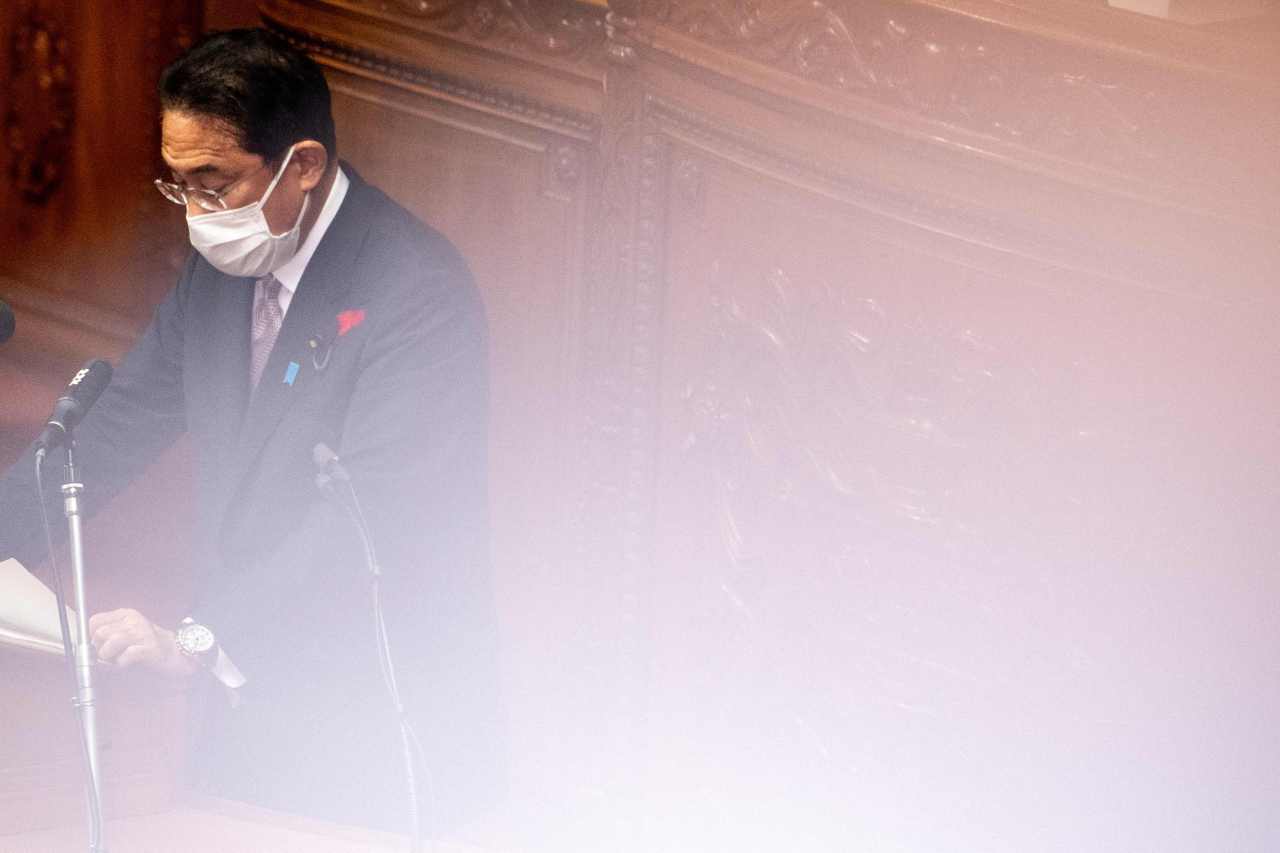
Japan's new Prime Minister Fumio Kishida speaks during a Q&A session at the lower house of parliament in Tokyo on Monday. (AFP-Yonhap)
The first phone call between President Moon Jae-in and Japanese Prime Minister Fumio Kishida is being delayed, with Japanese media saying the new Japanese leader has little incentive to rush ahead of a major election later this month, his first test in domestic politics.
According to Japan’s Nikkei business daily on Tuesday, Kishida’s office and Japan’s foreign ministry have agreed not to prioritize South Korea for the new prime minister’s first phone calls with foreign leaders.
Kishida who took office on Oct. 4 has held his first phone conversations with leaders of five countries over the past week. The “Quad” alliance – the US, Australia and India – and two neighboring countries – China and Russia – took the center stage, while South Korea is seemingly being snubbed.
Given that his predecessor Yoshihide Suga held his first phone call with Moon on the ninth day into office, a call between Moon and Kishida is being further delayed.
Nikkei said Japan’s general election on Oct. 31 is the key reason behind the delayed call between Moon and Kishida.
Kishida has led a traditionally dovish faction within the ruling Liberal Democratic Party and his low-profile stance on South Korea and China has sometimes faced criticism from the party’s ultra-rightist wing.
The newspaper said Kishida is seeking not to be seen “weak” by delaying a call with Moon and reiterating a hardline stance on South Korea – a familiar strategy taken by his predecessors.
South Korea and Japan have long been at odds over territory and historical disputes stemming from Japan’s 1910-45 colonial rule of the Korean Peninsula.
In 2015, Kishida, then foreign minister, played a key role in striking a controversial 2015 agreement between Seoul and Tokyo to resolve the sex slavery issue “finally and irreversibly.” But Moon who took office in 2017 rebuked the agreement, saying the government has no intention to intervene in legal fights by individuals for compensation.
Korean victims of Japan’s atrocities during the colonial rule continued filing lawsuits and a series of court rulings here in favor of their claims have led to vehement protest by the Japanese government.
In an apparent retaliatory move, in 2019, Japan imposed restrictions on exports of three key industrial materials critical for South Korea’s chip and display industries, chilling the decades-old rivalry further.
Upon Suga’s election in September last year, Moon sought to ease tensions, urging Japan to return to dialogue without preconditions. But the Japanese government denied the overture, saying South Korea should come up with a solution to prevent recurring compensation claims by Korean victims of sex slavery and forced labor.
In his first parliamentary address on Friday, Kishida also reiterated that his government would “strongly urge South Korea to take appropriate action, in line with Japan’s coherent stance” so that bilateral ties can be restored to a “healthy state.”
He also retained two highest-profile members of Suga’s Cabinet – Foreign Minister Toshimitsu Motegi and Defense Minister Nobuo Kishi – to their current posts, hinting at no drastic change in his South Korea policy.
With their first call being delayed, chances are also slim for their summit talks for the time being. There were expectations about their meetings during the G-20 gathering and COP26 climate summit later this month, but Kishida, citing the tight campaign schedule, said he would attend the events virtually.
Suga finished his one-year tenure without holding a summit with Moon.
On Tuesday, Seoul’s presidential office repeated nothing has been decided on the phone call between Moon and Kishida.



![[Herald Interview] 'Amid aging population, Korea to invite more young professionals from overseas'](http://res.heraldm.com/phpwas/restmb_idxmake.php?idx=645&simg=/content/image/2024/04/24/20240424050844_0.jpg&u=20240424200058)


